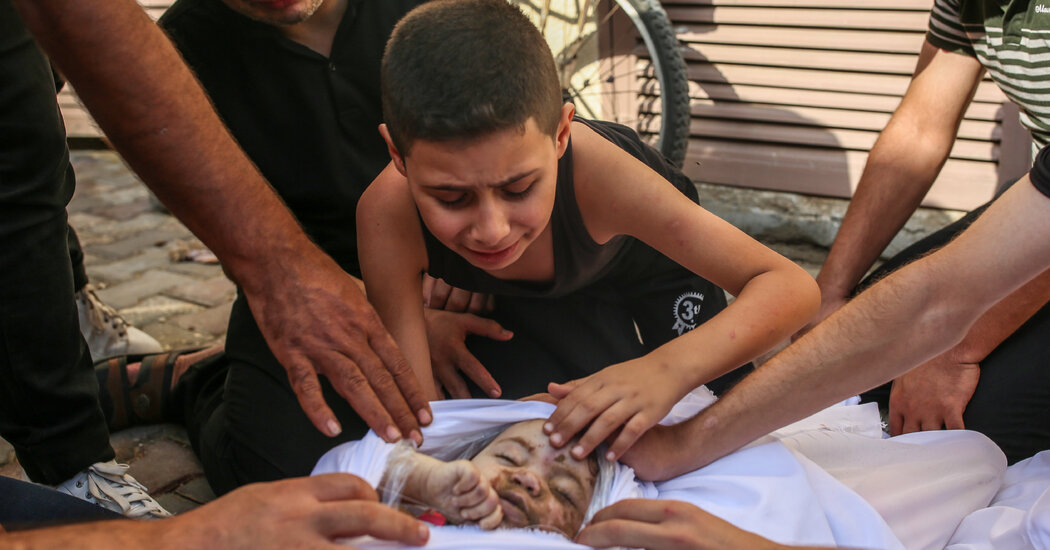“Asigning them a designation: ‘Child with unknown trauma,’ until someone recognizes them”, said. “The paralyzing thing is that some of them are the only survivors of their family, so no one ever comes to them.”
“It looks more and more like a war against children,” Dr. Abu-Sittah said.
Two weeks ago, Al-Shifa’s emergency room registered “1,500 children with unknown traumas,” Dr. Abu-Sittah said.
Then, in recent days, Israeli forces stormed the hospital, where thousands of Gaza residents had taken refuge, saying the facilities were built on top of an underground Hamas command center. United Nations officials warned that the incursion put Gaza’s most vulnerable at even greater risk.
International experts who worked with health officials in Gaza during this and other wars say the enclave’s hospitals and morgues collect and report the names, identification numbers, and other details of those killed in the territory. While the experts urged caution about public statements on the specific number of people killed in a particular attack, especially immediately after an explosion, they said total death tolls reported by health workers in Gaza have generally proven accurate.
The Israeli military says it “regrets any harm caused to civilians (especially children),” and adds that it is examining “all its operations” to ensure that it follows its own rules and adheres to international law.
But an increasing number of officials and human rights groups argue that Israel has already violated that law.
After condemning Hamas’ “outrageous, brutal, and scandalous” attacks as war crimes, Volker Türk, United Nations High Commissioner for Human Rights, said this month: “Israel’s collective punishment of Palestinian civilians also amounts to a war crime, as it leads to the forced and illegal evacuation of civilians”.
“Israel’s massive bombings have killed, maimed, and injured, particularly women and children,” he added. “All this has an unbearable price.”
Some international officials warn that children are in danger wherever they go. “There is no safe place for a million Gaza children to go,” said Catherine Russell, director of UNICEF.
On October 15, Dr. Mohammad Abu Moussa said he was on a 24-hour shift at Al-Nasr Hospital in Khan Younis, south of the evacuation line drawn by Israel, when he heard a loud explosion nearby. He called his wife at home, but when she answered, he said, all he heard were screams.
Shortly after, he said, his wife, his 12-year-old daughter, and his 9-year-old son were brought to the emergency room, bloody, hysterical, and covered in dust from the rubble. He tried to comfort them, but panicked when he noticed that his youngest son, 7-year-old Yousef, was not with them.
“Where is Yousef?” he recalled asking.
No one would answer.
When he pressed for information on his son, he said, a neighbor simply replied, “May God have mercy on his soul.”
Dr. Abu Moussa didn’t want to believe it. A video recorded by journalists inside the hospital shows him frantically searching for Yousef. Dr. Aby Moussa told the story of how he asked other departments, including the intensive care unit, if his son had been urgently moved there.
Then, he said, a journalist showed him pictures of his demolished home. Dr. Abu Moussa said he recognized the gray clothes Yousef was wearing when he kissed him goodbye before leaving home.
Fearfully, Dr. Abu Moussa walked from the emergency room to the hospital morgue. There he said he finally found Yousef, a joker with a cheeky smile who stuck out his tongue in photographs. Now, his lifeless body lay on a gurney.
The shock was too much to bear. Dr. Abu Moussa remembered looking away before a colleague embraced him.
Several relatives said the air strikes had hit their home without warning and that Dr. Abu Moussa’s family had been rescued from the rubble. The Israeli military said it could not answer questions about an attack on the family.
“Yousef was a very dear child,” said his mother, Rawan, a fitness instructor. “He was always smiling. He loved to laugh and make people laugh”.
At home, the boy wanted to eat every meal next to his father, or in his lap, sometimes even sharing the same spoon.
“He mimicked me in everything I did,” Dr. Abu Moussa said, adding that his son also wanted to be a doctor.
Yousef was not the only one killed. Dr. Abu Moussa’s brother, Jasir Abu Moussa, lost his two children and his wife, family members said.
Hmaid, Dr. Abu Moussa’s nephew, 18, had recently graduated from high school with high grades, the family said. From his father he inherited a love of cars, and from his mother, a love of poetry and art. He had hopes of studying mechanical engineering in Europe, his relatives said, and had begun studying German even while preparing for his high school exams.
His younger brother, Abdulrahman, 8, was even smarter, the family said. He was also killed.
“He was a handful,” Jasir Abu Moussa said of his younger son. “But he was also very intelligent and charming”.
Death also colors the living.
Many children show clear signs of trauma, including night terrors, said Nida Zaeem, mental health officer for the International Committee of the Red Cross in Gaza.
